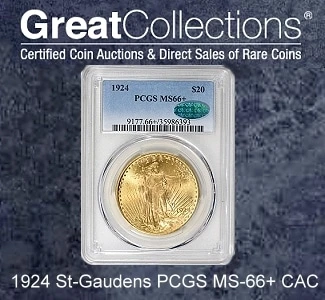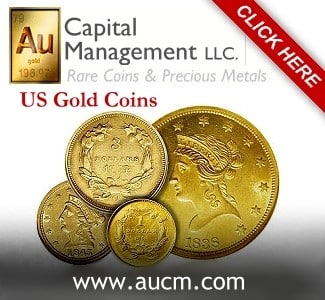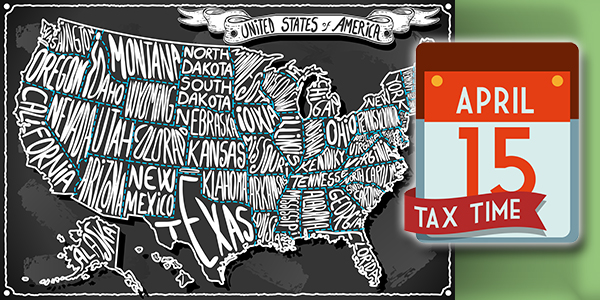
By Ron Drzewucki – www.moderncoinwholesale.com ….
Link to Part 1 | Part 2
In the U.S., sales tax is levied on a state and local level, so there is no one rule that fits all precious metal purchases. The complications wrought by conflict between the tax laws applying to the buyer versus the tax code applicable in the dealer’s location is inefficient and confusing at best, and inhibiting or even legally problematic at worst.
So to help our customers achieve a better understanding of the issue, Modern Coin Wholesale is happy to announce a new series of blog posts dedicated to a state-by-state breakdown of the relevant tax law pertaining to the sale and purchase of coins and bullion products.
As we do so, please keep in mind that Modern Coin Wholesale is not qualified to dispense legal advice and we are not at any time advocating a particular course of action. We are also not tax professionals. We merely wish to present this information in a relatively easy-to-understand way, enabling you, our customer, to judge for yourself what purchasing decisions are in your own best interest.
-Ron and the Staff at Modern Coin Wholesale
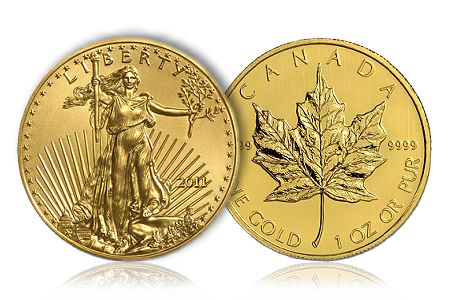
Mississippi
- Sales Tax: 7% – 7.25%
- Exemption: none
The sale of numismatic coins and precious metal bullion products in Mississippi is not exempt from sales tax. According to the Department of Revenue, collectible coins and bullion fall under the definition of “tangible personal property” and are charged the statewide 7% base sales tax rate per single transaction.
Cities and municipalities may charge additional sales taxes, with a maximum of 7.25% charged in some locations.
The 7%+ tax rate also applies to use tax, which, if you’re not familiar with the term, is a tax on the consumption (use) of goods within the state by legal residents.
Missouri
- Sales Tax: none
- Exemption: N/A
Missouri charges no sales tax on the purchase of coins and or precious metal bullion products.
And like Michigan, numismatic and collectible coins are referred to as “investment” coins.
“Bullion” is defined as “gold, silver, platinum or palladium in a bulk state, where its value depends on its content rather than its form, with a purity of not less than nine hundred parts per thousand.”
Montana
- Sales Tax: none
- Exemption: N/A
Like Alaska, Delaware, New Hampshire and Oregon, there is no state sales tax in Montana. I won’t get into the details of how each state’s tax regime works here, but understand that each one is different and often means other forms of taxation are set at higher rates. Montana, for instance, has higher income tax rates.
But if you’re not a resident that’s not your concern. However, some places charge special resort taxes (I’m not sure how they work or if they affect purchases, let alone coins and bullion). Rest assured, major Montana cities like Billings, Bozeman, Helena and Missoula will not charge taxes on your transactions.
Nebraska
- Sales Tax: none
- Exemption: N/A
Good news! As of April 1, 2014, Nebraska no longer charges sales tax on sales of currency and bullion products. When it comes to bullion, state law refers to the usual suspects (gold, silver, platinum and palladium).
Currency, meanwhile refers to coins made of “gold, silver, or other metal” and paper that has served as legal tender
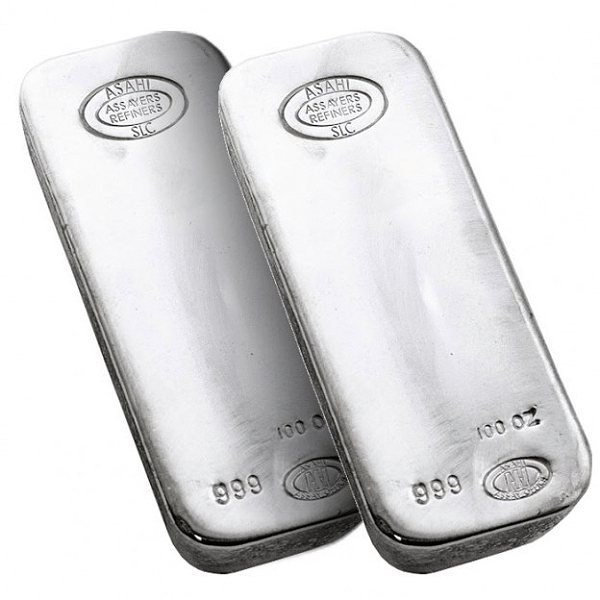
Nevada
- Sales Tax: 6.85% – 8.1%*
- Exemption: none
The “Snowy One” is an interesting case – and that’s not a good thing.
Basically, taxes are applied based on the premium on bullion and numismatic items (source: PDF). If a coin or bullion product is sold for higher than an additional 50% over face value (a total price of greater than 150% face value), then it is subject to sales tax.
Bullion at melt, however, is not.
Coins and notes that are no longer legal tender (meaning “Classic” material) are taxed regardless of price.
Also, cities and other municipalities can charge their own sales tax. Yes, that 8.1% represents Las Vegas (Clark County).
New Hampshire
- Sales Tax: none
- Exemption: N/A
As mentioned under the entry for Montana, New Hampshire has no sales tax, period. Numismatic items such as coins and paper money, and precious metal bullion products of any shape and variety, are not taxed.
New Jersey
- Sales Tax: 7%
- Exemption: none
Thank goodness for small miracles.
While New Jersey does apply a statewide sales tax of 7% on all sales of numismatic coins, bullion coins and other bullion and precious metal products, it prohibits the collection of local and city sales tax on top of that.
There is no exemption for single transactions over a certain dollar amount, however.
New Mexico
- Sales Tax: N/A
- Gross Receipts Tax: 5.125% – 8.6875%
- Exemption: none
New Mexico does not have a sales tax, per se, but it does have a gross receipts tax. The burden of the gross receipts tax is placed on the business, so as you can guess, the dealer is more or less forced to pass the costs onto his or her customers.
The statewide base gross receipts tax rate is 5.125%, but cities and local municipalities add as much as 3.5625% more. It varies from place to place.
There is no exemption in place for transactions involving coins or bullion that sell for over a given dollar amount.
New York
- Sales Tax: 4% – 8.875%
- Exemption: bullion ≥ $1,000
Sales tax in New York (source: PDF) is even more complicated than in California.
All collectible coins and other numismatic items are subject to a base rate sales tax of 4%, but city and local sales tax can increase that percentage to as high as 8.875%. In addition, localities may charge other taxes on the sale of such items that push the total cost to the consumer even higher.
Precious metal bullion products are also taxed, but transactions greater than or equal to $1,000 are exempt from sales tax. However, the exemption does not apply if the price of the bullion depends on any other factor besides the intrinsic value of the metal and the dealer is not registered with the New York Department of State.
As such, potential customers of dealers based in New York State must practice due diligence.
Also, the price paid must not exceed 140% of the face value or close-of-day market price for silver coins, 120% for quarter-ounce or less gold coins, and 115% for all other bullion coins and products.
Bullion products from South Africa–including the krugerrand–are NOT exempt from sales tax.
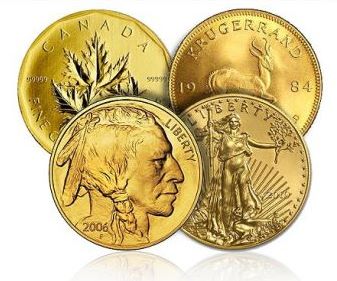
North Carolina
- Sales Tax: 4.75% – 8.25%
- Exemption: none
North Carolina charges a 4.75% statewide base sales and use tax on numismatic coins and bullion. Cities and counties may also charge their own sales and use taxes, ratcheting the gross tax paid per transaction up to as high as 8.25% in some locales.
No exemption for sales over a certain dollar amount is currently in place.
North Dakota
- Sales Tax: none / 5%
- Exemption: N/A
North Dakota law (source: PDF) exempts the sale of foreign and domestic “legal tender coins” from taxation, as well as .999 fine precious metal bullion products. This not only means that numismatic items such as tokens and medals are taxed at the state rate of 5%, but that precious metal bullion products of lesser purity than 99.9% (such as sterling silver, which is 92.5% pure) are also taxable.
There is no single transaction dollar amount exempted from sales tax should the item(s) being purchased be taxable.
Ohio
- Sales Tax: 5.75% – 8%
- Exemption: none
A sales tax rate of 5.75% is charged across the state of Ohio, with local and city taxes increasing the amount paid (source: PDF) to as high as 8%.
Ohio used to have a sales tax exemption on the books, but a massive 2005 political corruption scandal (“Coingate”) involving a rare coin investment fund that went all the way up to the governor’s office brought an end to the old tax regime.
Oklahoma
- Sales Tax: 4.5% – 11%
- Exemption: precious metal bullion
Interesting…
Okay, so Oklahoma does charge sales tax on numismatic coins. The statewide base rate is 4.5%, and like so many other states, local municipalities can add as much as 6.5% in sales tax – making for an 11% tax rate altogether in select areas.
This is as high as it gets out there.
However, as of 2014 Oklahoma law makes gold, silver, platinum, palladium and other precious metal bullion products exempt from taxation. Previously, all bullion products were taxable unless they were stored in special state-recognized bullion depositories.


